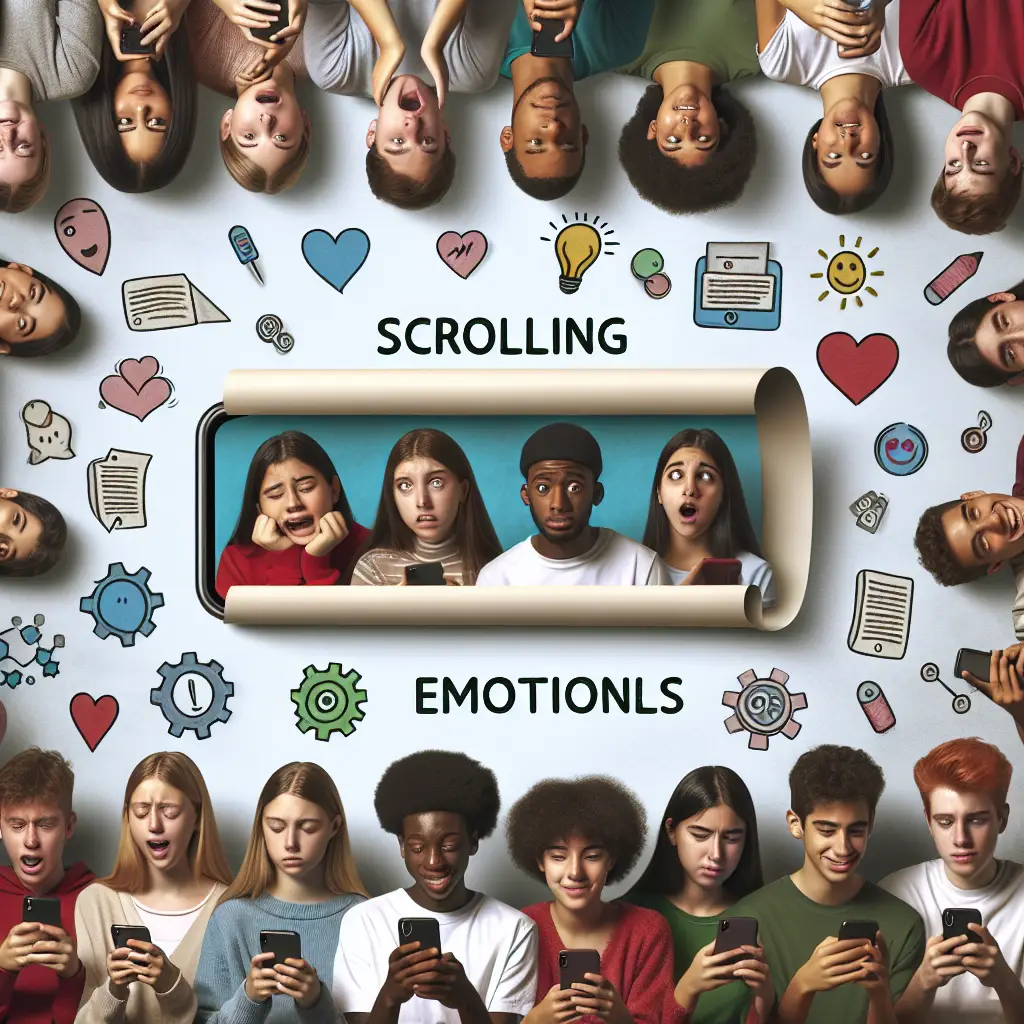
Scrolling Through Emotions: The Essential Impact of Social Media on Teen Mental Health
Introduction: The Double-Edged Sword of Connectivity
Imagine a world where your thoughts, feelings, and experiences can be shared with just a tap on a screen. For today’s teenagers, social media is not just a platform; it’s a lifeline, a source of connection, and often, a complex web of emotions. But what happens when scrolling through social media becomes more than just mindless entertainment? As we delve into Scrolling Through Emotions: The Impact of Social Media on Teen Mental Health, we will examine the undeniable influence platforms like Instagram, TikTok, and Snapchat have on young minds, exploring both the positive connections and the lurking shadows of mental challenges.
Understanding the Landscape of Teen Social Media Use
The Rise of Teen Social Media Engagement
Social media usage among teenagers has skyrocketed. According to the Pew Research Center, approximately 95% of teens have access to a smartphone, and about 80% use social media. This staggering statistic signifies the importance of understanding how these platforms shape emotional well-being.
In this section, we will explore how teenagers use social media and why it matters. Are they connecting with friends, exploring new interests, or dealing with social pressures? By examining these questions, we can gain crucial insights into the link between daily scrolling and emotional states.
| Table 1: Average Daily Social Media Usage Among Teens | Platform | Average Time Spent (hours/day) | Primary Use |
|---|---|---|---|
| 2.2 | Photo sharing, connecting with friends | ||
| TikTok | 1.5 | Entertainment, trends, self-expression | |
| Snapchat | 1.3 | Messaging, sharing moments with friends | |
| 0.8 | Community groups, events, family |
The Emotional Spectrum of Social Media
As teens engage with social media, they navigate a complex emotional landscape. Content can evoke joy, empowerment, anxiety, or even depression. For many, scrolling through social media acts as an emotional rollercoaster.
- Positive Engagement: Teenagers find validation through likes and comments, building self-esteem and fostering creativity.
- Negative Impacts: Conversely, the need for validation can also lead to anxiety, body image concerns, and fear of missing out (FOMO).
In this section, we delve into the emotional spectrum experienced by teens as they scroll through their feeds. Case studies will enrich our understanding of these experiences.
Case Study: The Power of Online Activism
Take the example of a teenager who becomes involved in online activism through social media. Platforms like Instagram allow them to connect with movements that resonate with their values, fostering a sense of purpose and belonging. In a study conducted by the University of California, it was found that teens participating in online activism reported higher levels of self-esteem and social connectedness.
Analysis: This case study illustrates how social media can empower teens, transforming their scrolling habits from passive consumption to active engagement.
The Dark Side: Cyberbullying and Social Comparison
Despite the positive impacts, the darker aspects of social media cannot be overlooked. Cyberbullying is rampant in online spaces, and the emotional toll this takes on teenagers is staggering. A study by the Cyberbullying Research Center noted that about 37% of teens have experienced bullying online.
- Social Comparison: Social media offers a constant stream of curated images, leading to unhealthy comparisons. Teens often measure their self-worth against their peers’ highlighting only the best moments of their lives.
Case Study: Understanding Cyberbullying’s Effects
Consider the case of a teenager who faces cyberbullying after sharing personal content online. Researchers from a Michigan university found that victims of cyberbullying experienced heightened levels of anxiety, depression, and suicidal thoughts. The similar emotional responses observed among these teenagers underline the critical connection between Scrolling Through Emotions: The Impact of Social Media on Teen Mental Health and the negative experiences they may endure.
Analysis: This case study highlights the urgent need for addressing cyberbullying, stressing the importance of mental health resources that can provide support for affected teens.
Navigating Mental Health in the Social Media Era
The Role of Parents and Guardians
Understanding the impact of social media on mental health is essential, but it’s equally vital for parents and guardians to engage in conversations about these platforms.
- Open Dialogue: Encourage teens to share their online experiences, stressing that it’s okay to discuss feelings related to their interactions.
- Setting Boundaries: Parents should help establish healthy limits to social media use, promoting balance in their children’s lives.
Empowering Teens to Take Control
- Education: Equip teens with the knowledge to discern between healthy and unhealthy social media habits.
- Digital Literacy: Encourage critical thinking about online content, including recognizing manipulated images or misleading narratives.
Table 2: Tips for Parents on Supporting Teen Mental Health
| Tip | Description |
|---|---|
| Foster Communication | Encourage open dialogues about online experiences |
| Monitor Usage | Keep an eye on the time spent on platforms |
| Promote Offline Activities | Help teens find hobbies and interests outside of social media |
Case Study: The Power of Supportive Communities
In a recent project, a group of high school students created a support group that met weekly to discuss their social media experiences. Researchers at Yale found that participants reporting their feelings in a supportive environment significantly decreased symptoms of anxiety and depression.
Analysis: This example underscores the importance of fostering supportive communities, highlighting that candid conversations about social media can relieve emotional stress.
The Psychological Impact: Studies and Statistics
Depression and Anxiety Trends Among Teens
Research consistently shows a troubling connection between social media use and increased rates of depression and anxiety among teenagers. A meta-analysis published in the Journal of Adolescence found that higher social media usage correlates significantly with symptoms of depression.
- Quantitative Finding: For instance, teens using social media more than three hours a day were twice as likely to experience mental health issues compared to their peers who limited their usage.
Case Study: The Correlation of Social Media and Mental Health
A longitudinal study conducted by the University of Pennsylvania examined a group of teens who reduced their social media usage to 30 minutes a day. Results indicated notable improvements in emotional well-being, with participants reporting lower levels of depression and loneliness.
Analysis: This provides powerful evidence of how mindful consumption of social media can lead to healthier outcomes, emphasizing the need for self-regulation among users.
Proactive Measures: Interventions and Resources
Implementing Mindfulness Practices
Teens can be encouraged to practice mindfulness as a tool for managing their social media habits. Techniques such as journaling, meditation, or even scheduled digital detoxes can greatly alleviate mental health challenges.
- Tips for Mindfulness: Encourage teens to take screen breaks, practice gratitude, or engage in physical activities as alternatives to scrolling.
Leveraging Technology for Good
Technology isn’t solely a culprit in the mental health crisis; it can also be a significant part of the solution.
- Apps for Mental Health: Introduce teens to apps designed to cultivate mental well-being, such as Headspace for meditation or Moodpath for tracking emotional states.
Table 3: Helpful Apps for Teen Mental Health
| App | Purpose |
|---|---|
| Headspace | Guided meditation and mindfulness practices |
| Moodpath | Mental health assessment and journaling |
| Be Buddy | Peer-to-peer support network for mental health |
| Calm | Sleep stories and relaxation techniques |
Conclusion: Transforming Scrolling Through Emotions
As we explore the topic of Scrolling Through Emotions: The Impact of Social Media on Teen Mental Health, it becomes clear that social media is both a tool for connection and a potential source of emotional turmoil. The relationship between teens and social media remains complex, filled with ups and downs.
However, empowered engagement can lead to healthier interactions with technology. By implementing mindfulness practices, fostering open conversations about online experiences, and advocating for educational initiatives around digital literacy, we can create a generation of savvy consumers capable of navigating their online environments.
In an era defined by connectivity, it’s crucial to remember that behind each screen, there’s a heart that feels. Together, we can harness the power of social media while protecting and uplifting the mental health of our teens.
FAQs
1. How does social media contribute to anxiety in teenagers?
Social media can contribute to anxiety in teenagers through constant comparison, cyberbullying, and the pressure to maintain a perfect online persona. These experiences can lead to heightened feelings of inadequacy and overwhelm.
2. Are there any positive impacts of social media on teen mental health?
Absolutely! Social media can foster a sense of community, provide necessary support networks, and increase awareness of mental health issues. Many teens find validation and connection through online platforms, promoting their emotional well-being.
3. What can parents do to protect their teens from negative social media impacts?
Parents can establish open communication, set reasonable boundaries for social media use, and monitor online interactions. Encouraging offline activities and promoting digital literacy is also vital.
4. How can teens change their social media habits to improve their mental health?
Teens can reduce usage time, curate their feeds to include positive influences, and take regular breaks from platforms to refresh their minds and emotions. Practicing mindfulness can also help them manage their feelings surrounding online interactions.
5. Is there evidence linking social media use to depression in teens?
Yes, numerous studies have shown correlations between high social media usage and increased levels of depression among teens. This connection underscores the importance of mindful consumption and the potential impact on mental health.
By understanding the emotional dynamics of Scrolling Through Emotions: The Impact of Social Media on Teen Mental Health, we can work towards not only protecting our youth but also unlocking the potential of social media as a force for good. As we evolve with technology, let’s ensure that mental health remains a pivotal point of focus in the digital age.

















